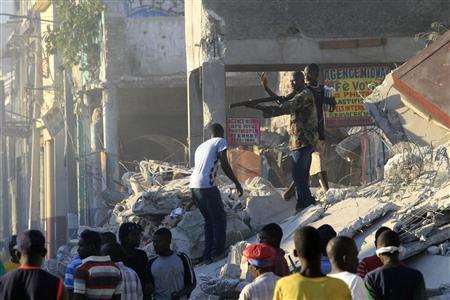-survivors flee city, looting spreads
PORT-AU-PRINCE, (Reuters) – President Barack Obama declared one of the largest relief efforts in U.S. history to help Haiti as survivors begged for aid and looters fought in the streets four days after an earthquake killed up to 200,000 people.
Even as aid poured into wrecked Port-au-Prince today, thousands of Haitians streamed out on foot with suitcases on their heads or jammed into cars to find food, water and shelter in the countryside and flee aftershocks as well as the threat of violence.
Logjams still kept major relief reaching victims and gangs of robbers have begun preying on survivors struggling without supplies in makeshift camps on streets strewn with debris and decomposing bodies.
In one part of the city, men with stones, knives, ice-picks and hammers battled to grab T-shirts, bags, toys and any other items they could find in destroyed houses and shops after scarce police patrols left, a Reuters photographer said.
Obama promised help as U.S. Secretary of State Hillary Clinton flew to Haiti where the shell-shocked government gave the United States control over its main airport to guide aid flights from around the world. With the government saying up to 200,000 people may have been killed, the quake could be one of the ten deadliest in history.
“We’re moving forward with one of the largest relief efforts in our history to save lives and deliver relief that averts an even larger catastrophe,” Obama said today, flanked by his predecessors George W. Bush and Bill Clinton.
Haiti is the Western Hemisphere’s poorest country and has for decades struggled with devastating storms, floods and political unrest. Around 9,000 U.N. peacekeepers have provided security here since a 2004 uprising ousted one president.
Hillary Clinton arrived in Haiti and was to meet with Haitian President Rene Preval. Her plane brought in supplies and was to return with evacuated Americans.
Even four days after the 7.0 magnitude quake, aftershocks were felt every few hours in the capital, terrifying survivors and sending rubble and dust tumbling from buildings.
Trucks piled with corpses have been ferrying bodies to hurriedly excavated mass graves outside the city, but thousands of bodies still are believed buried under rubble.
U.S. rescuers worked through the night to dig out survivors from one collapsed supermarket where as many as 100 people could have been trapped inside. They were about to give up, when they were told a supermarket cashier had managed to call someone in Miami to say she was still alive inside.
“We have already collected around 50,000 dead bodies,” Interior Minister Paul Antoine Bien-Aime told Reuters. “We anticipate there will be between 100,000 and 200,000 dead in total, although we will never know the exact number.”
Most of the dead already collected have been buried in mass graves.
Scores of police were deployed on the streets of downtown Port-au-Prince earlier today, rounding up looters in the biggest security operation since the earthquake struck.
A Reuters photographer saw police shooting in the air, grabbing and throwing people to the ground, and occasionally kicking detainees in parts of the city. But they later left, and a new round of looting erupted.
“It’s anarchy there now, total chaos, the police have gone away,” photographer Carlos Barria said. “They are fighting, hitting each other, throwing stones at each other.”
Looting had been sporadic since Tuesday’s earthquake, which flattened large parts of the capital. But it appeared to be widening today as people became more desperate.
Hungry residents fought each other for bags of foods handed out from U.N. trucks in downtown Port-au-Prince.
A senior U.N. official warned hunger will fuel trouble if aid does not arrive soon, although the law and order situation remains under control “for the time being.”
The U.N. mission responsible for security in Haiti lost at least 36 of its 9,000 members when its headquarters collapsed. Two top officials are missing.
Dozens of bloated bodies were still dumped in the yard outside the main hospital today, decomposing in the sun. The hospital gardens were a mass of beds with injured people, with drips hanging from trees and tubes.
The weakened Haitian government was in little position to handle the crisis. The quake destroyed the presidential palace and knocked out communications and power. Preval and Prime Minister Jean-Max Bellerive are living and working in the judicial police headquarters.
“I do not have a home, I do not have a telephone. This is my palace now,” Preval told Reuters in an interview.
The U.S. Navy hospital ship Comfort, a full service medical facility that can handle up to 1,000 patients, left the port of Baltimore today and was due in Haiti next week.
STILL NO WATER
Obama said the United States, Brazil, Mexico, Canada, France, Colombia, Russia, Japan, Britain and other countries managed to fly in rescue and logistics personnel and supplies. While some aid was getting in, the White House hoped improved logistics would accelerate the effort.
Planes and ships arrived with rescue teams, search dogs, tents, water purification units, food, doctors and telecom teams, but faced a bottleneck at the small airport.
Air traffic control, hampered by damage to the airport’s tower, will be handled by the U.S. military with backup from a nuclear-powered aircraft carrier.
The USS Carl Vinson with 19 helicopters arrived off Haiti on Friday, opening a second significant channel to deliver help. Navy helicopters had begun taking water ashore and ferrying injured people to a field hospital near the airport.
The U.S. military aimed to have 9,000 to 10,000 troops on the ground in Haiti in ships offshore by Monday.
The Pan American Health Organization said at least eight hospitals and health centers in Port-au-Prince had collapsed or sustained damage and were unable to function.
At one collapsed supermarket, scores of people swarmed over the rubble to try to reach the food underneath. Just outside the Cite Soleil slum, desperate people crowded around a burst water pipe jostling to drink from the pipe or fill buckets.






